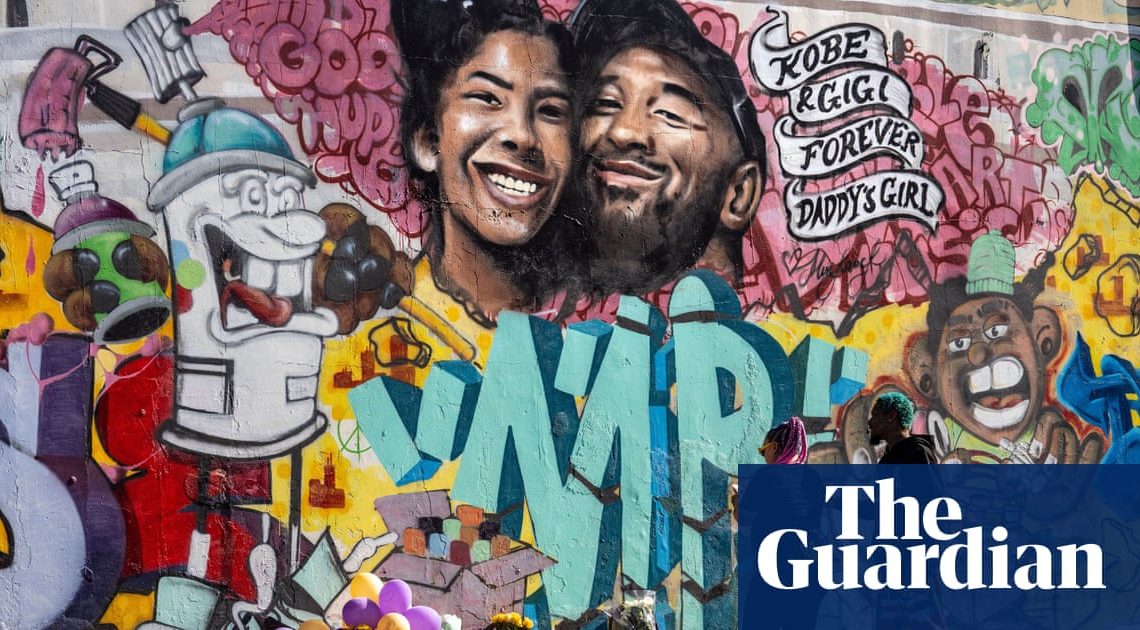
LA mourns Kobe Bryant, activist and icon: ‘We didn’t just lose a basketball player’
February 1, 2020Tributes spring up across the city, where many saw him as a beacon of hope in an era of deep division
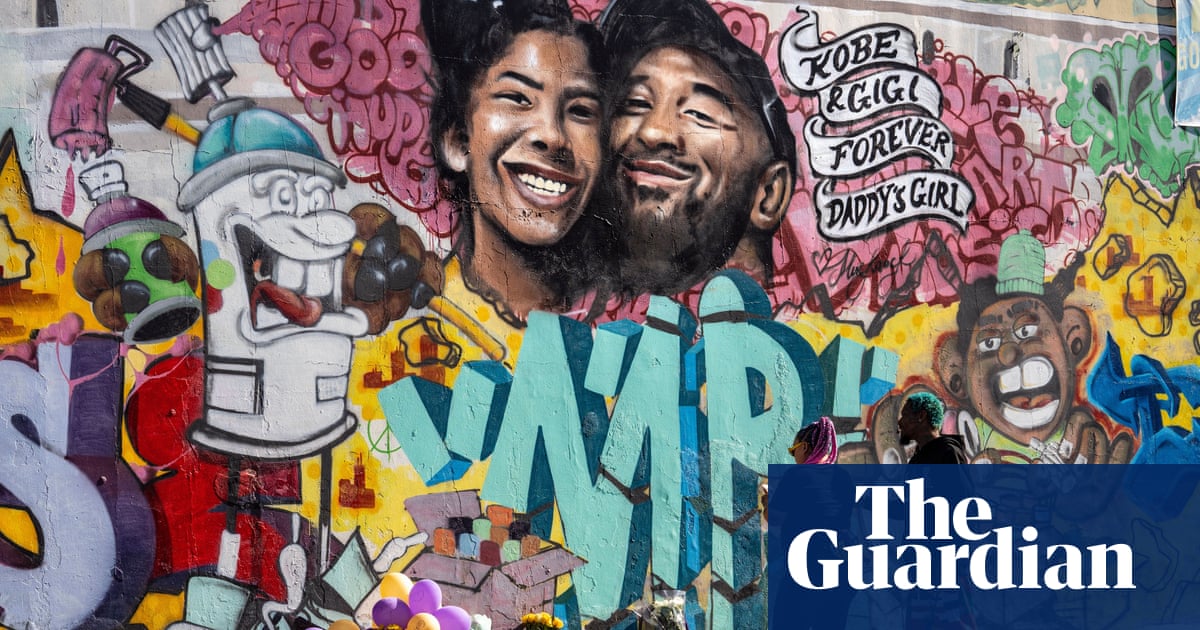
In Los Angeles, everyone is mourning Kobe Bryant in their own way.
Within hours of his death on Sunday morning, his name was popping up on city buses and commuter trains, in graffiti spray-painted on random walls, and in a thousand tributes left outside the downtown Staples Center, which witnessed the peak of his glory as one of basketballs towering greats.
Latino fans commended his soul to the Virgin of Guadalupe. People were crying in public, and a number of black families were wearing Kobe jerseys as they walked to school on Monday morning.
Artists found space to paint large murals depicting Bryant and his 13-year-old daughter Gianna, who died with him. His basketball numbers popped up on the ferris wheel of the Santa Monica pier and on the marquee of a downtown theater. City leaders, meanwhile, lit up public buildings and fountains in purple and gold, the colors of the Lakers, for whom Bryant played all 20 of his professional seasons.
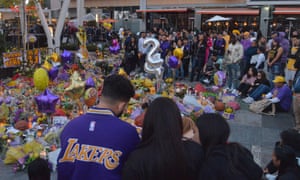
As the days pass, it has become clear that this is no ordinary grief. Kobe, as everyone knew him, was a man who touched an extraordinary number of lives in an extraordinary number of ways.
He was an advocate for victims of police violence a stance that other black athletes have adopted at their peril but he also donated money to a widows and childrens fund for cops killed in the line of duty. He was an African American role model in a city with a dwindling black population, but he was also adored by Latinos who appreciated his efforts to learn Spanish and called him compa, short for compadre, or friend.
The foundation he established with his wife, Vanessa, has promoted youth sports, of course both soccer and basketball and it has also worked to get LAs soaring population of homeless young African Americans off the streets.
We didnt just lose a basketball player. This was someone who was becoming a pillar of the community beyond athleticism, said Isaac Bryan, who directs the Black Policy Project at the University of California, Los Angeles. Its hard to find things for black people in LA to look up to. We dont have those historic leaders the way we once did.
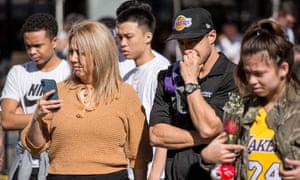
For African Americans, losing Bryant was particularly brutal because it came just 10 months after the Los Angeles rap star and social activist Nipsey Hussle was shot dead at the age of 33. These guys embody what LA can mean for young people, Bryan added. To know that even someone like Kobe, even someone like Nipsey cant make it to a full life thats hard.
The admiration for Bryant has not been without its complexities. Many argue that his 2003 rape case, which ended with an out-of-court settlement and a striking apology, has been too readily brushed under the carpet, whether out of deference to his loved ones, or his fans, or some notion that popular heroes deserve forgiveness for their transgressions. We are excellent, the feminist lawyer Jill Filipovic wrote on the day of Bryants death, at sidelining the inconvenient parts, at least when the inconvenient parts are women weve made invisible and the one inconvenienced is a man we would prefer to keep admiring without complication.
Still, in an age of deep social and political divides, Bryants ability to connect with people from many different backgrounds and viewpoints made him remarkable. He could mingle comfortably with his fellow celebrities and, as the son of another professional basketball player, had every advantage growing up.
Yet he had a ferocious work ethic that earned him unwavering respect across professional sports and gave hope to ordinary people that with enough determination and hard work they could achieve anything the essence of the American dream that has seemed unreachable for many in recent decades.
What was most important and what stood out about you the most is that no matter what, you kept shooting, Marqueece Harris-Dawson, an African American city council member in Los Angeles, told Bryant on his retirement in 2016. I think thats a lesson to all of us and a lesson to this city.
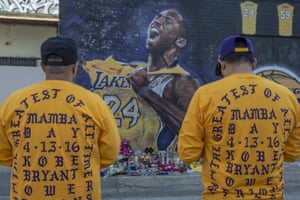
As Bryants basketball career wound down, he worked just as hard to understand how he could use his visibility and celebrity to boost the causes he cared about. He trod uncertainly into the issue of police violence at first, but raised eyebrows after the death of Eric Garner at the hands of a New York City police officer in 2014, when he donned an I Cant Breathe protest T-shirt at a pre-game warm-up. It was, Isaac Bryan said, an artful way to make a statement without verbally making a statement.
He became a staunch supporter of the family of Trayvon Martin, the Florida teenager shot dead by a neighbor who later cited the states Stand Your Ground gun laws to avoid prosecution, and he showed up in a Travyon T-shirt for a protest in Los Angeles alongside Nipsey Hussle.
More recently, Bryant hosted screenings of the movie Just Mercy, about a wrongful conviction overturned by the Alabama civil rights lawyer Bryan Stevenson, and took part in a discussion with its stars, Jamie Foxx and Brie Larson. He also championed a summer educational program for lower-income students, showing up in person so he could inspire them to fight all the disadvantages life had dealt them and succeed anyway.
Bryant talked a lot about justice and, against the odds, became one of the very few black Americans who could talk about it with conviction to a broad audience. Rest in power, LAs mayor, Eric Garcetti, said, as he announced that City Hall and the glass pylons at the Los Angeles airport would remain illuminated in purple and gold for the rest of the week.
Not too many ball players, even the great ones, get a send-off so overtly political and are loved for it anyway.
Read more: http://www.theguardian.com/us

